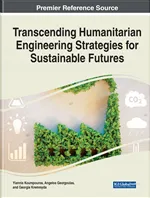Transcending Humanitarian Engineering Strategies for Sustainable Futures
Angelos Georgoulas (University of West Attica, Greece), Georgia Kremmyda (University of Warwick, UK) and Yiannis Koumpouros (University of West Attica, Greece)
The ENHANCE team are proud to present our second book "Transcending Humanitarian Engineering Strategies for Sustainable Futures". This book contains work by ENHANCE collaborators from all participating institutions as well as members of our broader network.
The book is published by IGI and is available via IGI Global.Link opens in a new window
Engineering disciplines have a pivotal role to play in the solution of global humanitarian challenges, enabling our society to take steps towards sustainable human development. Engineering can be used as the catalyst for the change that the world needs; from water supply to renewable energy provision, engineering knowledge and application underpin the responses needed for us all to pursue a sustainable future. Because the issue of humanitarianism is not just engineering problems, there is a need to engage with professionals, breakdown previously siloed approaches and obdurate practices, and introduce interdisciplinary education and training to enhance combinational expertise.
Transcending Humanitarian Engineering Strategies for Sustainable Futures provides relevant theoretical frameworks and the latest empirical research findings in the area of humanitarian engineering as a means for future-proofing our communities. Covering topics such as disaster mitigation, natural hazards, and land use change, this premier reference source is an excellent resource for engineers, environmentalists, sociologists, anthropologists, urban planners, government officials, students and educators of higher education, non-profit organizations, researchers, and academicians.
The many academic areas covered in this publication include, but are not limited to:
- Antibiotic Resistance
- Coastal Towns
- Cultural Heritage Sites
- Disaster Mitigation
- Ecosystem Services
- Engineering Schools
- Humanitarian Engineering
- Land Subsidence
- Land Use Change
- Natural Hazards
- Neuroimaging Techniques
- Pesticides
- Soft Engineering
